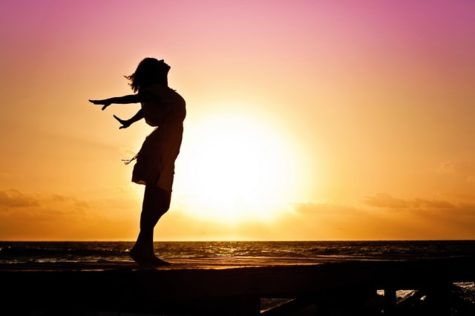BUFFALO — When it comes to seeking solitude, many people often blame mental health issues as an underlying cause. But a new study finds that being alone has its benefits too, particularly when it comes to people looking for a surge of creativity.
Researchers at the University of Buffalo interviewed 295 privacy-valuing individuals who reported a variety of reasons for their tendency to spend a lot of time alone, ranging from feeling fear or anxiety around others to preferring to use spare time working on a craft.

Although research has traditionally suggested that excessive time alone can be unhealthy, some seclusive pursuits, such as trying to connect to nature or get a better sense of self, can be constructive, the researchers found.
“We have to understand why someone is withdrawing to understand the associated risks and benefits,” says Julie Bowker, the study’s lead author, in a university release.
“When people think about the costs associated with social withdrawal, oftentimes they adopt a developmental perspective,” she continues. “During childhood and adolescence, the idea is that if you’re removing yourself too much from your peers, then you’re missing out on positive interactions like receiving social support, developing social skills and other benefits of interacting with your peers.”
Bowker believes that the presumed downsides of being alone and withdrawing have lent such a preference a hard-to-erase stigma.
More recent research, including this latest study, has begun to recognize the potential benefits of alone time — provided it’s an intentional choice prompted by positive emotions.
Deeming individuals who follow such guidelines “unsociable,” Bowker explains that they may enjoy reading, working on the computer, or otherwise spending precious time alone.
Importantly, unsociable individuals, whether young and old, are not at increased risk of experiencing negative health outcomes. In fact, the researchers found that they may enjoy a special benefit: improved creativity.
“Although unsociable youth spend more time alone than with others, we know that they spend some time with peers. They are not antisocial,” Bowker emphasizes. “They don’t initiate interaction, but also don’t appear to turn down social invitations from peers. Therefore, they may get just enough peer interaction so that when they are alone, they are able to enjoy that solitude. They’re able to think creatively and develop new ideas — like an artist in a studio or the academic in his or her office.”
Other, less healthy forms of isolation include social avoidance (i.e., choosing to withdraw due to fear), and social withdrawal (i.e., shyness), she notes.
While these two forms may overlap with unsociability, neither would appear to confer the benefits of the latter.
“Over the years, unsociability has been characterized as a relatively benign form of social withdrawal,” Bowker concludes. “But, with the new findings linking it to creativity, we think unsociability may be better characterized as a potentially beneficial form of social withdrawal.”
The study’s findings were published Personality and Individual Differences.

Every day I take stock of all the things I have to be grateful for. Number one on the list is ‘I never got married’.
Anthony Storr made a similar argument back in 1988 in his book Solitude: A Return To The Self …
And other than gang members what is a common trait of murderers? that’s right mental illness and isolation from normal persons
Define “normal persons.”
I seek isolation from people because I generally find them obnoxious and often times malevolent. While you find the self-isolating individual as potentially malevolent.
Interesting.
Yes, you sound intelligent. Seek someone to help you.
Just had to work in the passive- aggressive dig, after the compliment, didn’t you? “Obnoxious” case in point.
Look at the imogee? you choose to represent you. I may be your best friend to say the truth.
I didn’t realize there were even 295 people still living in Buffalo. Hard to have much of a social life when you’re under 50 feet of snow for 10 months a year.
Uh. Yeah. No kidding. Ask any mom, or dad for that matter, with three kids what they want most for Christmas. They’ll tell you just a couple hours ALONE.
Being
alonean Individual can be good for your mental health. Leftist Tribalism IS a mental illness.All this time feeling slightly guilty because I enjoy being alone at times,
it takes courage.
Well it still beats watching the NFL…then again, getting your hand stuck in a waffle iron pretty much does as well.
Study finds that study findings range from suspect to self-serving to bogus.
Stupid. One study finds being alone “may” be good for us, another study states the opposite. And these studies are supposed to be conducted by “experts”?
And water is wet.
Being alone also prevents one from getting involved with this social media bull. sh.t because you do not need to massage your ego and
justify your existence. Nobody knows what I have been doing or have done, so? Who give a crap, I see that as good! I know who I am, don’t need anyone to justify me existence.
I love being alone. I do whatever I want. I’ll never get married. Don’t want to. Some of the most famous writers, poets, musicians, and conquerers were loners. I digress….
And just last week there was an article that definitively states being alone leads to early death.
in my 20’s i would get a gf and no matter how great a girl she was it wouldn’t be long until i was dying to be alone again… rinse and repeat… over and over.
It all sounds great until your creativity involves collecting squirrels for the carnival in mom’s crawl space. Apparently that’s impolite.
Written for progressive idiots that no one can stand to be around for more than a couple of days.
I think that people who do studies on being alone are mentally ill. Me..I like being alone because people are so d a m n stupid.
If you do not like being alone it is because you are in poor company.